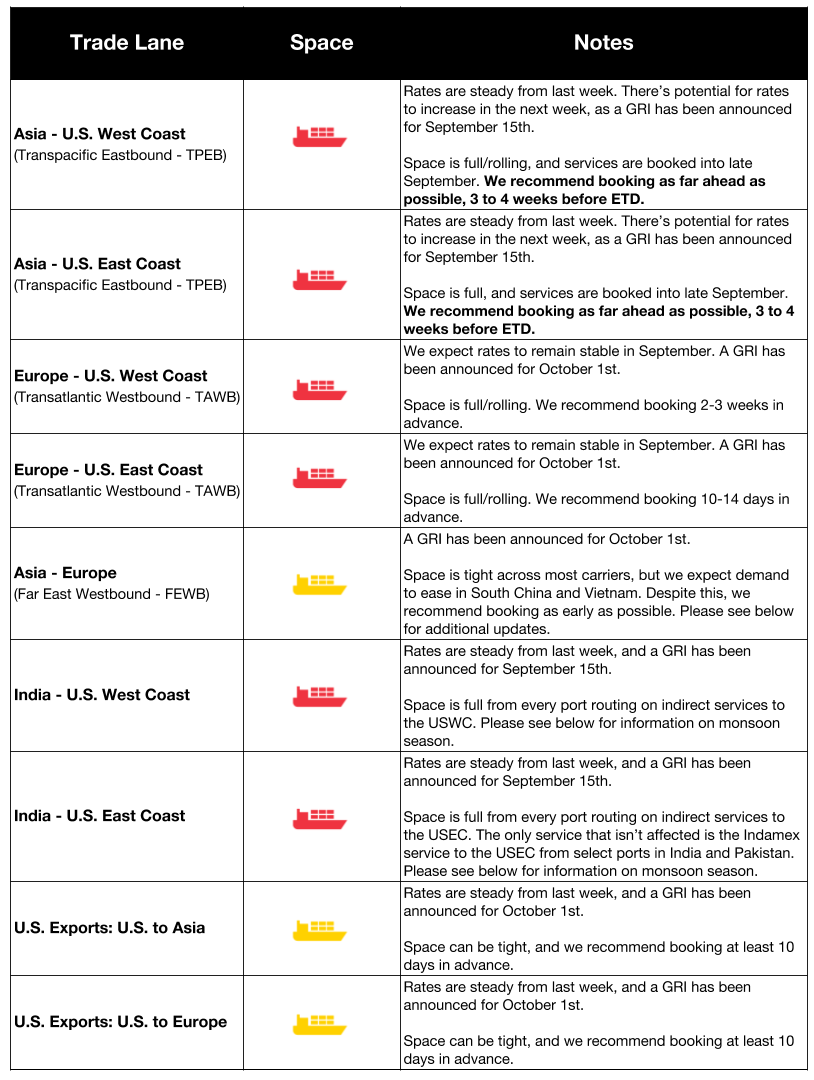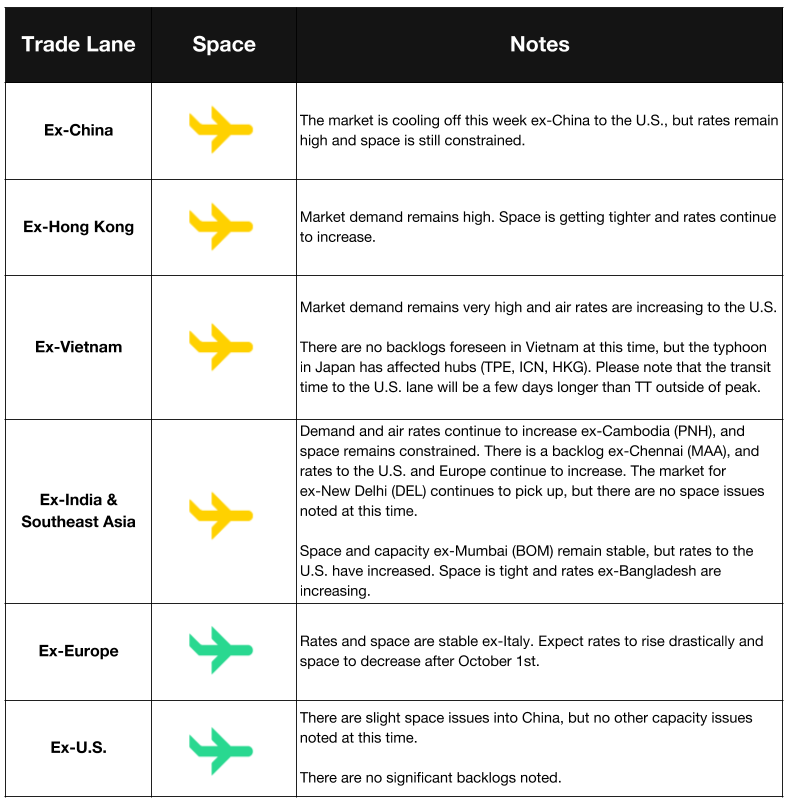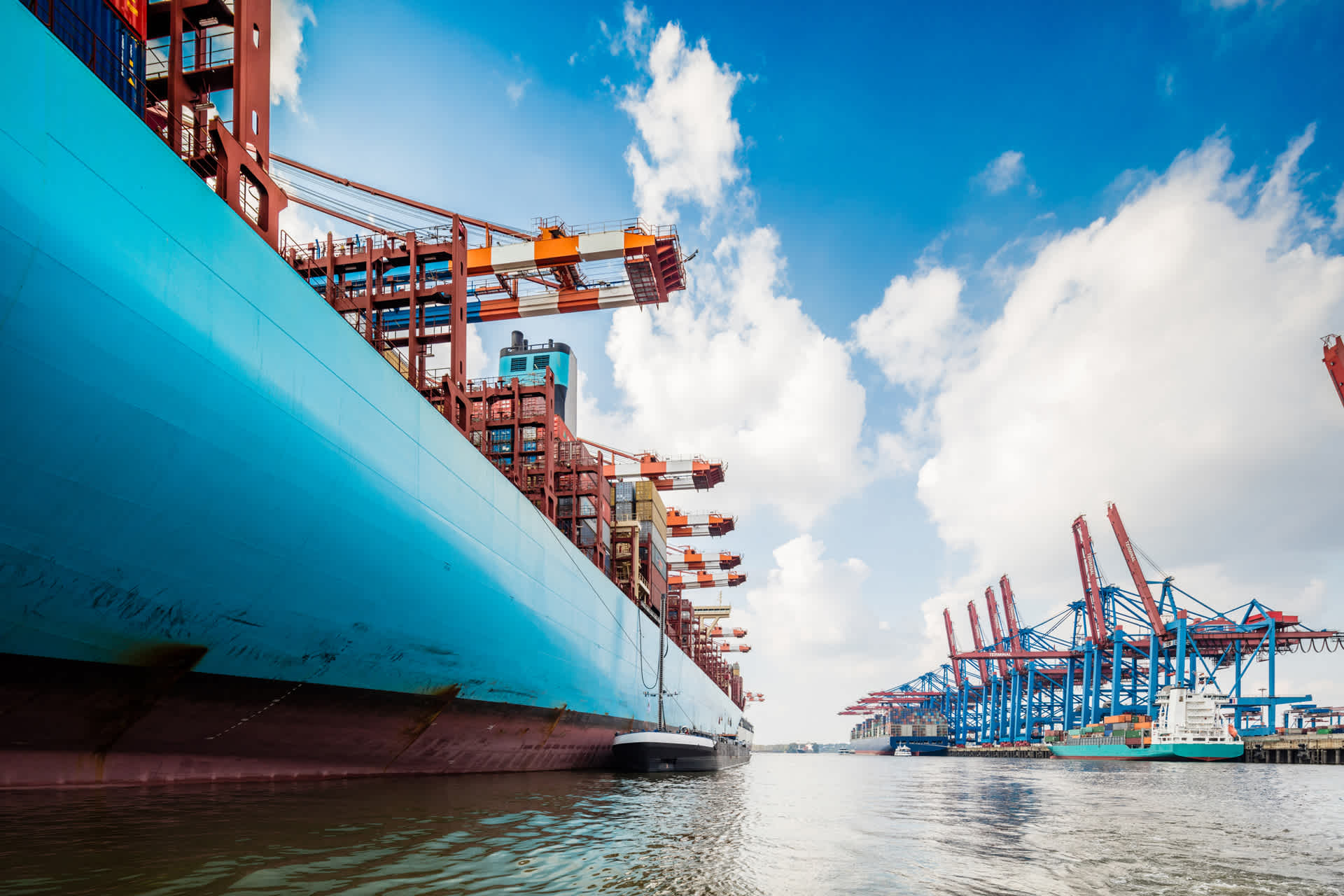Global Logistics Update
Freight Market Update: September 12, 2018
Ocean, trucking, and air freight rates and trends for the week of September 12, 2018.
Freight Market Update: September 12, 2018
Want to receive our weekly Market Update via email? Subscribe here!
Ocean Freight Market Updates

Shippers Prepare for Hurricane Florence
Hurricane Florence is expected to make landfall on Thursday, September 13th, as a category 4 hurricane. Due to mandatory port closures and evacuation orders, you may see delays for your shipment(s). As always, our team will notify you as soon as we’re aware of any changes that might impact you.
Peak Season Sees Highest Ocean Freight Spot Rates in 2 Years
Shippers moving freight from China to the U.S. are seeing some of the highest ocean freight spot rates in over two years, reports Supply Chain Dive. The increased rates are largely attributed to three factors: higher crude oil costs, an earlier peak season, and carriers cutting capacity.
Transpacific Eastbound (TPEB) Services Full Into Late September
TPEB space is full/rolling, and we recommend booking services as early as possible - at least 3-4 weeks before ETD. Please also note that carriers are announcing blank sailings for October and November, which will further constrict space.
Updates for Far East Westbound (FEWB) Lane:
- Equipment shortage in East China, mainly Ningbo
- Typhoon season has led to delays and build a small backlog
- Felixstowe remains a challenge in Europe, with services omitting and performing cut and run on several occasions
- Carriers are announcing void sailings ahead of Golden Week
India’s Monsoon Season is in Effect
Monsoon season is in effect from June through October:
- We highly advise shrink wrapping all FCL/LCL pallets and cartons that may be prone to being affected at the time of origin stuffing
- Expect vessel delays/port closures due to weather constraints
- Indian POL’s that receive the most rainfall are Chennai, Tuticorin, and Kochi
Overbooked Ships Cause Thousands of Containers to Roll
U.S. importers are having a more difficult time this year getting their cargo on ships due to the very low capacity. JOC reports, “The eagerness of carriers to capitalize upon an early surge in cargo resulting from importers’ panic over Trump administration tariffs, typhoons in Asia, and a calculated reduction in capacity, is fraying relationships with customers.”
We recommend booking shipments as early as possible to guarantee space.
**Trans-Pacific Peak Season Sees Higher Rates **
U.S. importers shipping in trans-Pacific should expect higher rates, as peak season has caused very low capacity on most ships. As JOC reports, “Ocean carriers in certain cases are holding the line on weekly minimum quantity commitments (MQC) as they have done in prior periods of tight capacity, meaning that any given shipper will be allocated only one week’s worth of capacity out of its total annual MQC.”
Impact of New IMO ECA Regulations
The International Maritime Organization has mandated under new Emission Control Area regulations that by 2020, all merchant vessels must reduce their sulfur emissions to 0.5% from 3.5%.
Whether they upgrade their vessels or their fuel, carriers will need to undertake significant changes to comply with the new regulations, and those changes will come at a cost to shippers. Rates may climb between now and 2020 as a result.
Air Freight Market Updates

Air Freight Peak Season Takes Flight in September
The transpacific air freight sector sees tight capacity and high rates as peak season soars, reports The Loadstar. Aside from standard peak season causes, the threat of a new round of tariffs has motivated many to move up shipments. Europe’s peak’s season is likely to begin soon, as well.
Air Freight Market Looking ‘Weak’ Amid Approaching Peak Season
Air volume growth was “virtually flat” in July, reports The Loadstar. Despite this, volume growth year-over-year is still up with rates 15-20% higher than in 2017.
According to a report from Logindex, global industrial production will reach its lowest monthly increase since July 2015. The report noted that the trade tariffs have now begun to negatively affect volumes, predicting a weak September. “Also, Chinese export growth, YoY, will likely slow down from 12.2% in July to 7% in August and 4.5% in September.”
Trucking Market Updates
Early trans-Pac Peak Means Higher Truck Rates Ahead
JOC reports that the early peak shipping season could mean earlier-than-usual rate increases for truck and intermodal shipments in the U.S. As capacity tightens and rates increase, we recommend booking shipments as early as possible.
U.S. Businesses Feel the Effects of Low Trucking Capacity
As factories ramp up production to meet the needs of the fast-growing U.S. economy, many businesses report that it’s been very difficult to find trucking capacity in the current market. This is affecting companies to the point of cutting their full-year earnings reports, as they know they won’t be able to move product as previously expected.


